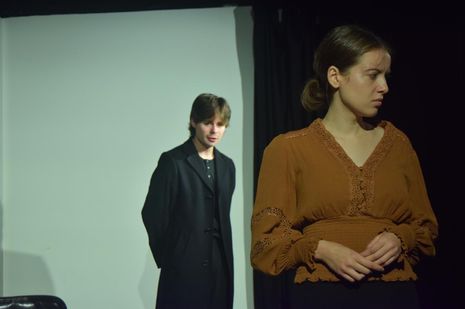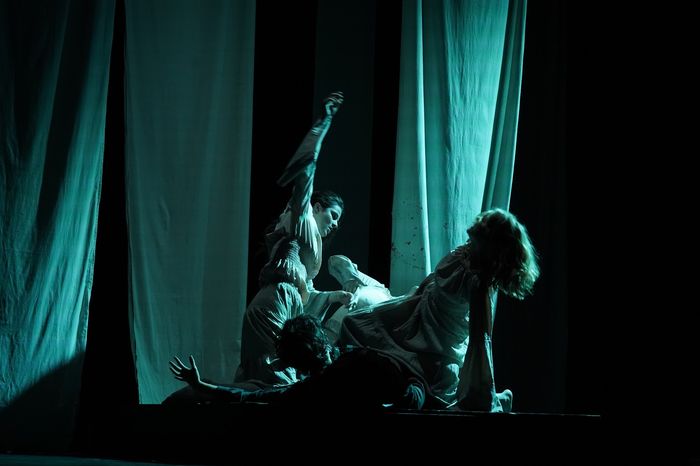Ibsen’s Ghosts transfixes the Corpus Playroom
This slow-burn production, underset by haunting cello music, combines incredible performances with sharp technicality

The haunting tones of the cello set the stage. In the small, dimly lit space of Corpus Playroom, an unsettling rhythm envelops both actors and audience. A sparse set leaves much to the imagination, a visual manifestation of the cold uncertainty pervading the narrative. Although framed only by a plain backdrop, the dynamics among characters draw a striking bite. Directed by Theo Parkin, this production resurrects Henrik Ibsen’s original three-part domestic tragedy; a play which subverts traditional morality and deconstructs expectations of generational trauma.
“The cello’s resonance lingers throughout, folding around the silences and taut exchanges”
The cello’s resonance lingers throughout, folding around the silences and taut exchanges. The actors shone through the dialogue, creating a satisfying push-and-pull which makes the audience complicit in their exchange of guilt and shame. The play opens with Jacob Engstrand (Harry Davies) and his daughter Regina (Anaïs Pelletreau). Both actors captured the quietly corrosive relationship between them, setting up the tension between pretence and reality; their first interaction embodying the social tug-of-war that overarches the play. At times, I felt the consistently serious tone lost my focus, leaving more to be desired from the satirical bite that underlies the dialogue. That said, the play really found its rhythm during the conversation between Helene and the Pastor, which was able to balance both the absurdity and the seriousness of the narrative. Jacob Smith stood out in his performance as the Pastor, enhancing the character’s neurotic obsession with societal values through a mordant slant that bordered on sardonic. It’s a performance that both unsettles and amuses, embracing an irony that did not dilute the message but rather magnified it: a bite I believe true to Ibsen’s original vision. Perhaps I wanted more comedic moments - or maybe I’m just an exhausted student craving levity.
Danny Andrews’s cello breaks the stillness once more, his music established as fundamental in the play’s cadence. Its mellow rhythm worked well as a recurring motif, almost a ghost itself, pulsing through the narrative. The cyclicality of the cello’s interludes was one of my favourite elements; so, perhaps I’m biased when I suggest they could’ve been longer or more frequent. Using this element more would’ve really driven home its symbolism as a manifestation of the shadow that Helene Alving, our main character, tries so earnestly to confront.
“I was suspended in the same emotional void that had captured Oswald and Helene”
Hope Taylor-Marsh played Helene with respect to her standing as the moral and emotional centre of the play, an embodiment of the complex interplay between social expectations and personal integrity. She balanced the emotional back-and-forth of a mother trying to simultaneously move forward with her life whilst hiding the ghosts of her past. As such, her interactions with her son, Oswald (Joe Wright), were almost haunting to watch: tender and tragic, a relationship bound by repression and moral collision. I was particularly struck when the sins of Oswald’s father were finally revealed. The weight of the confession hung in the silence between them, and I was suspended in the same emotional void that had captured them. The internal struggle of Helene was palpable, her words commanding the stage, a visible strain on the previously gentle dynamic between mother and son. Their shadows cast behind them on the wall seemed to mirror their fragile intimacy, a visual echo of their haunting, and the dissonance between appearance and reality. In this moment, I was grateful for the minimalist staging, as it focused our attention entirely on the actors before us, and visually represented their confinement in the secrets of the past.
“We are all brought into this generational cycle of sin, implicated in this moral entanglement”
Through minimalist lighting (Holly Helbert), the stage seemed even more hollow, emphasising the claustrophobia of this confinement and the tension between appearance and truth. This tension culminates in the final sequence, which bathes the audience in a concluding ‘white-out’ – a symbolic illumination. Ibsen’s message lands clearly: we are all brought into this generational cycle of sin, implicated in this moral entanglement. The past folds into the present, and the line blurs between those on stage and those in the audience, between performance and reality.
With the cello framing each interval, we are reminded that we can only escape our ghosts if we confront them. The closing repetition drives this point home like the banging of a gavel, begging the question: can we ever be free from our ghosts? As the revelatory sun spills over the final tableau, the light creating a ghost of Oswald on the chaise longue, we are left with a ruthless cliffhanger. Is Oswald the final ghost his mother must get rid of? I’ll let you decide.
 News / Right-wing billionaire Peter Thiel gives ‘antichrist’ lecture in Cambridge6 February 2026
News / Right-wing billionaire Peter Thiel gives ‘antichrist’ lecture in Cambridge6 February 2026 Features / From fresher to finalist: how have you evolved at Cambridge?10 February 2026
Features / From fresher to finalist: how have you evolved at Cambridge?10 February 2026 Film & TV / Remembering Rob Reiner 11 February 2026
Film & TV / Remembering Rob Reiner 11 February 2026 News / Churchill plans for new Archives Centre building10 February 2026
News / Churchill plans for new Archives Centre building10 February 2026 News / Epstein contacted Cambridge academics about research funding6 February 2026
News / Epstein contacted Cambridge academics about research funding6 February 2026










